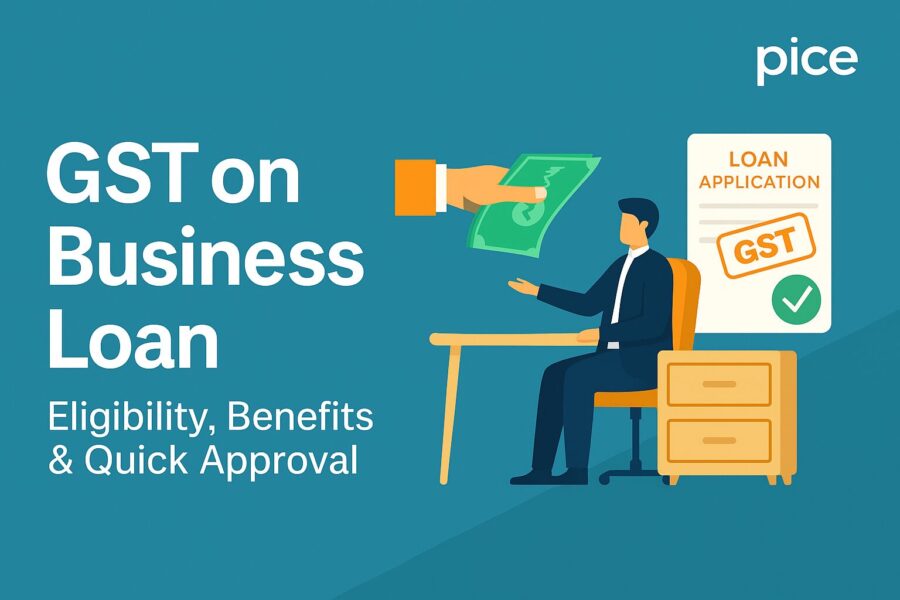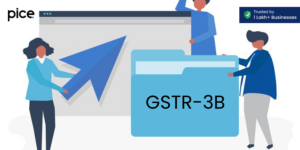GST Business Loan: Eligibility, Benefits & Quick Approval
- 14 Nov 25
- 10 mins

GST Business Loan: Eligibility, Benefits & Quick Approval
Key Takeaways
- GST business loans are unsecured, short-term loans offered based on consistent GST return filings and reported turnover.
- These loans require minimal documentation, no collateral, and rely primarily on your GST filings and business credit history.
- Eligibility depends on valid GST registration, three years of operations, stable turnover, and clean credit behaviour.
- Banks evaluate GST data from the last 6–12 months to decide loan amount, interest rates, and financial health.
- Timely GST compliance, accurate filings, and organised documentation significantly boost loan approval chances.
Are you struggling to grow your business due to limited funds? You are not alone. Many MSMEs in India often face a lack of cash flow in their business. However, with consistent GST filings, your business is all covered.
Regular GST return filing reflects the financial transparency of your business, making you eligible to apply for a GST business loan. This article will help you understand this loan better and how you can apply for it quickly.
What is a GST Business Loan?
Following the introduction of the Goods and Services Tax in 2017, banks introduced a new type of short-term and unsecured loan for micro, small, and medium business entities. Since the loan is processed depending on the reported turnover in GST returns, it is referred to as the GST business loan.
Unlike other types of business loans, GST business loans do not require any additional authentication. The lender leverages the filed GST returns of an enterprise to evaluate its creditworthiness. The loan amount starts from ₹100,000 and can increase up to ₹30,000,000.
Please note that the processed loan amount often varies between banks. Please contact your lender to obtain an estimate.
GST Loan Eligibility Criteria
All kinds of business entities can opt for a GST business loan, including:
- Sole Proprietorship Firms
- Partnership Firms
- Private Limited Companies
- Public Limited Companies
To be eligible for the loan, businesses must possess:
- A valid GST registration
- 3 years of operational history
- Minimum turnover criteria
- Credit history
Please note: The interest rate of this term loan depends on the borrower’s credit history and the financial stability of the business. Companies with the least credit history can receive a striking GST loan interest rate of up to 25%.
7 Essential Documents for GST Business Loan
- Personal and business PAN cards
- Any residential proof (Aadhar card, voter's ID, driving license, ration card, etc.)
- Last 6 months’ banking statement
- GST registration certificate
- Trade licence
- ITR acknowledgment
- The last 6 to 12 months of GST filings
These KYC and business registration proof documents play a crucial role in speeding up the approval process.
GST Business Loan Application Process
Vendors can either opt for the offline or online process to apply for a GST business loan. Here’s a detail:
- Process of GST Loan Application Online
- Step 1: Visit the official website of your bank and navigate to the GST business loan section.
- Step 2: Click on ‘Apply Now’ and fill in the application form.
- Step 3: After inputting all the relevant details, an OTP will be sent to your registered mobile no.
- Step 4: Provide your business information and upload the banking statement and filed return documents of the last 6 months.
- Step 5: You will shortly receive a verification call from the bank’s end regarding the applicable loan and amount.
- Step 6: Shortly, the bank will disburse the loan.
Ensure that all your KYC documents and online tax payment records are up to date before starting the process.
How to Apply for a Business Loan Offline?
Interested individuals can also apply for the GST-based business loan offline. In such cases, you need to visit the bank, fill out the application form along with the necessary documents. The bank will verify the details and approve/reject the loan depending on the credit score and business performance. The approval time may vary between 24 and 72 hours, subject to eligibility and documentation.
What are the Features of a GST Business Loan?
The approval of the GST business loan relies on the filed turnover of your company. Borrowers’ income proof, whether in the form of P&L statements or a current account statement, is inessential here. In addition to the zero income-proof requirement, the GST business loan comes with other features:
- Contactless Loan Processing: The sole verification parameter in GST business loans is your business turnover as mentioned in the return. It speeds up the loan verification and disbursement process.
- Collateral-free Loan: GST loans are collateral-free. Therefore, borrowers do not have to lock in any assets to apply for this loan.
- Easy Documentation: To apply for a GST business loan, borrowers need to provide basic KYC documents and business registration proof.
How is the Loan Amount Calculated?
Since GST business loans are collateral-free, banks take your credit score, financial property and business growth performance into account. They evaluate these factors to estimate the maximum loan amount and rate of interest, ranging between 8% and 26%.
Banks often review filed GST filings of the last 6 months to assess the performance and growth metrics of your company. They also use your tax records, Online Tax Payment history, repayment history and financial transactions to calculate your credit score.
Pro Tip: Focus on maintaining fail-free GST compliance with timely filings and demonstrate a healthy financial standing of your organisation to get a loan at affordable interest rates.
4 Types of GST Business Loans That You Must Know
- Working Capital Loan - Not every enterprise generates sufficient revenue for seamless operational management. A working capital loan is a financial aid to sustain the day-to-day business needs.
- Overdraft - Business overdraft is a line of credit attached to your current account. You can withdraw funds from it at the time of need up to an approved limit. Interest charges apply only on the withdrawal funds.
- Letter of Credit - A letter of credit (LC) is a financial instrument which allows the issuing bank, on behalf of the buyer, to pay the amount of goods and services to the seller. LC is usually transferable from one trader to another.
- Bank Guarantee - A Bank guarantee is a financial assurance issued by the bank. It serves as a promise to pay to the beneficiary if the vendor defaults.
Suppose ABC is a newly launched furniture company that wants to buy ₹1 crore worth of wood and other materials. The supplier, to eliminate any payment risk, requires a bank guarantee before supplying the goods. The ABC company requested the bank, and consequently, the bank issued a bank guarantee assuring the supplier. The guarantee denotes that if the company fails to pay the supplier, the bank will.
Here is another example. A leading international textile company in Scotland, XYZ Limited, ordered a lump sum amount of fabric from its Indian exporter. The exporter received an export letter of credit from the Scottish company. The Indian exporter approached the bank and issued an LC, backed by the export LC, in favour of his local supplier. This way, every person in the supply chain gets payment assurance for their offerings.
Challenges and Considerations
Businesses can avail of the GST business loan with a repayment tenure of up to 36 months to streamline their business needs. However, they may encounter certain challenges. Take a look at some of them:
- Data Mismatch in GST Returns:
Errors and mismatched information in GST filings can negatively impact one’s eligibility for a business loan. Incorrect HSN codes and turnover misstatements raise serious concerns. These inaccuracies can straight lead to rejection.
- Fluctuation in Business Turnover:
While providing GST business loans, lenders look for businesses with consistent turnovers to prevent risk. Seasonal businesses with irregular revenue streams will be eligible for reduced loan amounts with higher interest rates.
- Documentation Complexity
Since the application of a GST business loan requires a series of KYC documents and statements, many small businesses find it burdensome to comply with the process. It often discourages them from applying for a business loan.
3 Tips for A Successful Loan Application
- Stay GST Compliant: Resolve existing GST issues, file returns on time, and avoid late tax payments.
- Keep Documentation Ready: Maintain valid GST registration, organise all key KYC documents, and business registration proof.
- Build Financial Credibility: Compare loan rates across banks and maintain strong relationships with lenders.
Conclusion
With a GST business loan, a trader can easily secure working capital. While conventional business loans take forever to approve, GST business loans are quick-approving, short-term and help to meet your business needs and fuel business growth. Looking for some funding for your business? Start with GST compliance.
 By
By 
















